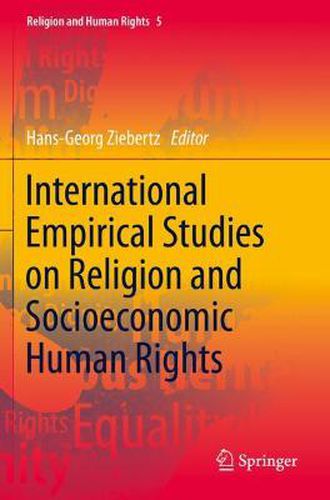Readings Newsletter
Become a Readings Member to make your shopping experience even easier.
Sign in or sign up for free!
You’re not far away from qualifying for FREE standard shipping within Australia
You’ve qualified for FREE standard shipping within Australia
The cart is loading…






This title is printed to order. This book may have been self-published. If so, we cannot guarantee the quality of the content. In the main most books will have gone through the editing process however some may not. We therefore suggest that you be aware of this before ordering this book. If in doubt check either the author or publisher’s details as we are unable to accept any returns unless they are faulty. Please contact us if you have any questions.
Socioeconomic rights include rights with regard to social security, labour and employment, as well as cultural rights which may be regarded as a shield for the protection of human dignity, especially of specific groups, such as women, children and refugees. The enforceability of socioeconomic rights clearly distinguishes them from other rights. These rights need, perhaps more than others, the support of civil society. Because states have leeway in how resources are distributed, civil society has a major impact on what resources are used to fulfil socio-economic rights. One of the actors in the public arena are religious traditions, respective Churches. Most of them have developed ethical standards for individual conduct and rules for living together in society based on their basic scriptures. All three monotheistic religions, Judaism, Christianity, and Islam, are marked by a caring engagement for the poor, the sick, the old and the foreign.
From an empirical perspective, the general research question of this volume is how young people understand and evaluate socioeconomic rights and to which degree religious convictions and practices are connected with attitudes towards these human rights. Can religion be identified as a force supporting the human rights regime and which additional concepts strengthen or weaken the consent to these rights? The richness of empirical data contributes to a better understanding how socioeconomic rights are legitimated in the opinion of more than 10.000 respondents in 14 countries.
$9.00 standard shipping within Australia
FREE standard shipping within Australia for orders over $100.00
Express & International shipping calculated at checkout
This title is printed to order. This book may have been self-published. If so, we cannot guarantee the quality of the content. In the main most books will have gone through the editing process however some may not. We therefore suggest that you be aware of this before ordering this book. If in doubt check either the author or publisher’s details as we are unable to accept any returns unless they are faulty. Please contact us if you have any questions.
Socioeconomic rights include rights with regard to social security, labour and employment, as well as cultural rights which may be regarded as a shield for the protection of human dignity, especially of specific groups, such as women, children and refugees. The enforceability of socioeconomic rights clearly distinguishes them from other rights. These rights need, perhaps more than others, the support of civil society. Because states have leeway in how resources are distributed, civil society has a major impact on what resources are used to fulfil socio-economic rights. One of the actors in the public arena are religious traditions, respective Churches. Most of them have developed ethical standards for individual conduct and rules for living together in society based on their basic scriptures. All three monotheistic religions, Judaism, Christianity, and Islam, are marked by a caring engagement for the poor, the sick, the old and the foreign.
From an empirical perspective, the general research question of this volume is how young people understand and evaluate socioeconomic rights and to which degree religious convictions and practices are connected with attitudes towards these human rights. Can religion be identified as a force supporting the human rights regime and which additional concepts strengthen or weaken the consent to these rights? The richness of empirical data contributes to a better understanding how socioeconomic rights are legitimated in the opinion of more than 10.000 respondents in 14 countries.